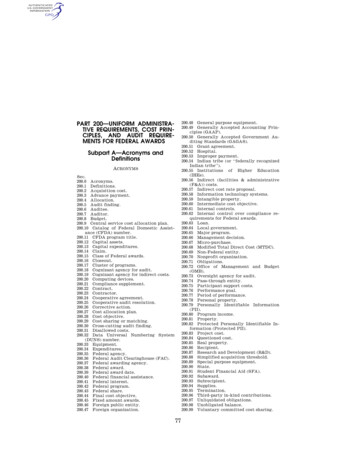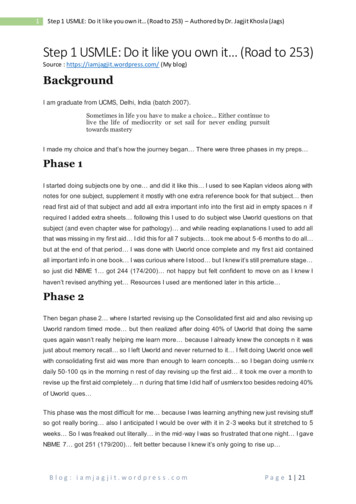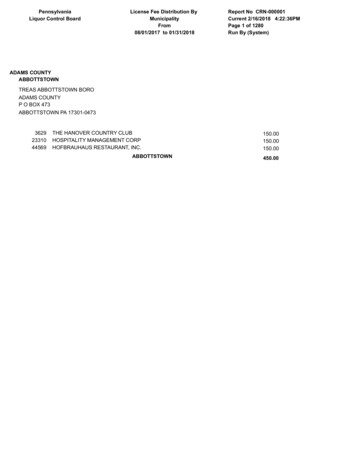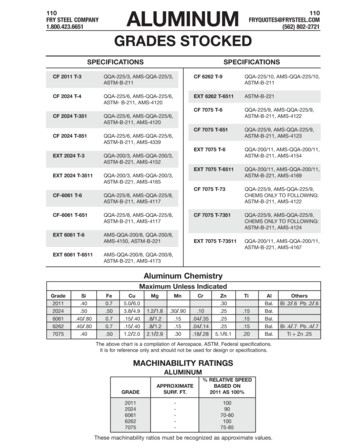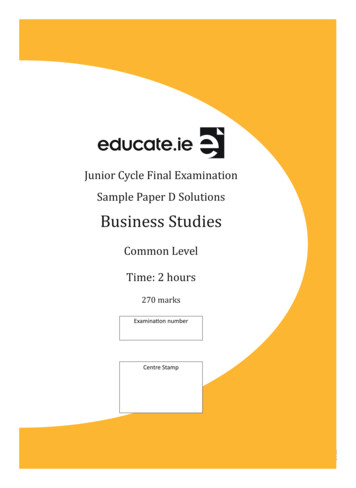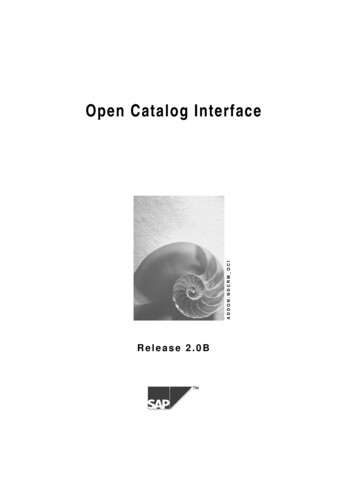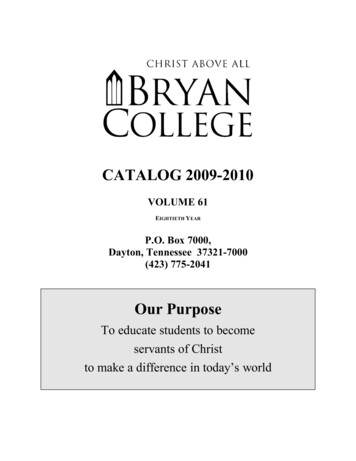
Transcription
CATALOG 2009 2010VOLUME 61EIGHTIETH YEARP.O. Box 7000,Dayton, Tennessee 37321 7000(423) 775 2041Our PurposeTo educate students to becomeservants of Christto make a difference in today’s world
A MESSAGE FROM THE PRESIDENT OF THE COLLEGESelecting a college is one of the most important decisions of your life, and yet isoften one of the most challenging. The most critical question which you will askto enable you to make that decision is this: “Is this the best college to prepare mevocationally to fulfill God’s calling on my life, equip me to engage the culturefrom a Christian world and life view, and encourage me to walk worthy of ourLord Jesus Christ, fully pleasing Him?”As a Christian liberal arts college, Bryan will challenge you academically tothink critically regarding the world of ideas while affirming the truth of the Wordof God as the foundation of all life and learning. We believe that the study ofevery discipline should enable you to see God’s creative hand and give Him glorythrough its pursuit. Bryan provides the type of academic rigor which prepares youto enter the best graduate and professional schools while growing in faith and thespiritual disciplines.Success in life is dependent upon gaining the tools which allow you tounderstand your discipline of study, think clearly and creatively, and articulateyour ideas in an effective way. A Bryan education will put you on a path oflifelong learning and living a life of true significance. I trust this Catalog willprovide you with sufficient information to help you make one of life’s mostimportant decisions. Bryan College – dedicated to understanding, engaging, andredeeming our culture for Christ’s kingdom.Stephen D. Livesay, Ph.D.PresidentPage 1
TABLE OF CONTENTSINTRODUCING BRYAN COLLEGE .4COLLEGE PERSONNEL .15CAMPUS LIFE .28ADMISSIONS INFORMATION.32FINANCIAL AID .38COLLEGE EXPENSES .46ACADEMIC INFORMATION .51DIVISION OF CHRISTIAN STUDIES .82DIVISION OF HUMANITIES .89DIVISION OF NATURAL SCIENCE .107DIVISION OF SOCIAL SCIENCE .116SPECIAL PROGRAMS .132COURSE DESCRIPTIONS .141CALENDAR FOR 2009 2010 ACADEMIC YEAR .185DIRECTORY OF CORRESPONDENCE .186INDEX .189Page 2Bryan College Catalog 2009 2010
EDUCATIONAL STANDINGBryan College isØ Accredited by the Commission on Colleges of the Southern Association of Colleges andSchools (1866 Southern Lane, Decatur, Georgia 404 679 4500) to award the associate,baccalaureate and master of business administration degrees.Ø Accredited by the International Assembly for Collegiate Business Education (IACBE).Ø Approved by the Tennessee State Board of Education for teacher education and licensure.Ø Approved by the Association of Christian Schools International for teacher education andcertification.Ø Listed in the Higher Education Directory, a publication of the DHEW, OE, and NCES.Ø Listed in the Accredited Higher Institutions Bulletin published by the United StatesDepartment of Education.Ø Listed in American Universities and Colleges, a publication of the American Council onEducation.Ø Approved under the various public laws, which have been passed by Congress for theeducation of veterans and eligible dependents of veterans including PL 16, PL 634, andPL 361.Ø Approved by the Immigration and Naturalization Service for the education ofinternational students.MembershipsAmerican Association of Christian CounselorsAppalachian Athletic ConferenceAppalachian College AssociationAssociation for Christians in Student DevelopmentAssociation of Business Administrators of Christian CollegesAssociation of Christian Schools InternationalAssociation of Church Related Colleges of the SouthAssociation of Fundraising ProfessionalsAssociation of Independent Liberal Arts Colleges withTeacher EducationChristian Stewardship AssociationChristian University Global NetworkChristians in the Visual ArtsCollege and University Personnel AssociationCouncil for Advancement & Support of EducationCouncil for Christian Colleges and UniversitiesCouncil for Higher Education AssociationDayton Chamber of CommerceEvangelical Council for Financial AccountabilityGreater Chattanooga Area Planned Giving CouncilNational Association for College Admission CounselorsNational Association of Christian College AdmissionsPersonnelNational Association of College and University BusinessOfficersNational Association of Foreign Student AdvisersNational Association of Intercollegiate AthleticsNational Association of Student Financial Aid AdministratorsNational Athletic Trainer AssociationNational Christian College Athletic AssociationNational Council on Planned GivingNational Planned Giving CouncilRhea Economic and Tourism Council, Inc.Southern Association of Collegiate Registrars and AdmissionsOfficersSouthern Association of Student Financial Aid AdministratorsSpring City Chamber of CommerceTennessee Advancement Resource CouncilTennessee Association of Colleges for TeacherEducationTennessee Association of Collegiate Registrars andAdmissions OfficersTennessee Association of Independent Liberal Arts Collegeswith Teacher EducationTennessee Association of Student Financial AidAdministratorsTennessee College AssociationTennessee Independent Colleges and Universities AssociationPage 3
INTRODUCING BRYANCOLLEGEContentsMission and Purpose. 6Essential Beliefs . 7Page 4Bryan College Catalog 2009 2010
History and Development . 10
MISSION AND PURPOSEFounded in 1930, Bryan College is situated on a beautiful 125 acre wooded hilltop in the Tennessee Valleycommunity of Dayton, Tennessee. Bryan College is an independent, coeducational, Christian liberal arts collegenamed for William Jennings Bryan (1860 1925), a prominent statesman in American political life. As an orator andnational leader, Mr. Bryan promoted the interests of the “common man” and defended the authority of the Bible as afoundation for public and private values.Institutional DistinctivesBryan College was established as a four year undergraduate college of arts and sciences, although until 1958the corporate title used the term “University.” In December, 2005 the College was authorized by the SouthernAssociation of Colleges and Schools (Commission on Colleges) to offer its first graduate degree: the Master ofBusiness Administration. Chartered in 1930 under the laws of Tennessee as a general welfare corporation with thebasic purpose of providing “for the higher education of men and women under auspices distinctly Christian andspiritual,” the College has responded to changing times with various modifications of its educational program. Thegoals for institutional development and the changing climate in American higher education will continue toinfluence the educational program. However, the original institutional purpose as a Christian liberal arts collegeremains unchanged.With an awareness of its heritage and a commitment to its future, the College endeavors to serve itsconstituencies by traditional and novel means. Bryan College maintains the following distinctives as part of itsvision for the next century.Bryan College has developed and will maintain: An identity as a Christian liberal arts college which is evangelical, nondenominational, and regionallyaccredited. A firm biblical emphasis, both in curriculum and in principles for everyday life, based upon unequivocalacceptance of the inerrancy and authority of the Scriptures. A Christian worldview as the foundation for the engagement of faith, learning, and living. A competent faculty committed to a quality academic program. A balanced position regarding theological beliefs, daily life and conduct, and educational philosophy andpractice. A close bond of fellowship and a sense of community under the Lordship of Jesus Christ that fosterspositive relationships among faculty and students of diverse backgrounds. A commitment to a progressive approach in addressing the technological nature of our changing society. A setting of natural beauty where lake and mountains meet, ideal for serious study and growth.Institutional PurposeThe basic purpose of Bryan College is to educate students to become servants of Christ to make a difference intoday’s world. The College seeks to assist in the personal growth and development of qualified students byproviding an education based upon an integrated understanding of the Bible and the liberal arts.Page 6Bryan College Catalog 2009 2010
Educational Goals – Learning OutcomesIn order to maintain its distinctives and pursue its institutional purpose, the Bryan College community strivestogether to accomplish seven educational goals expressed as learning outcomes.1. Students will develop a knowledge of the Bible and the liberal arts and an ability to harmonize thatknowledge through an understanding of their relationships.2. Students will develop competency in one or more subjects as a foundation for graduate studies or vocationsrelated to the disciplines of Christian Studies, Humanities, Natural Science, and Social Science.3. Students will demonstrate academic excellence by thinking critically, working independently andcooperatively, communicating clearly, and expressing themselves creatively.4. Students will develop wholesome attitudes, healthful habits, responsible citizenship, constructive interestsand skills, and the recognition that education is a continuing process for both faculty and students.5. Students, faculty, and staff will serve the local community and the Bryan constituency with academic andcreative experiences and consultative services in ways consistent with the educational philosophy, purpose, andresources of the College.6. Students will mature spiritually and engage in opportunities for Christian leadership, ministry, service,worship, and discipleship.7. Students will enhance their undergraduate and graduate education and participate in research projects andcolloquia conducted by Bryan's faculty, academic departments, and affiliate and ancillary organizations.ESSENTIAL BELIEFSThe college charter states that no sectarian test or statement of belief is to be imposed on any student. It alsospecifies that anyone serving as a trustee, officer, or member of the faculty must subscribe to the Statement ofBelief, which appears below. The College’s religious position and control, educational philosophy, and Christianlife standards are consequential outcomes of the Statement of Belief.Statement of BeliefThis Statement of Belief is reported to have been formulated and adopted at the 1919 PhiladelphiaConvention of the World’s Christian Fundamentals Association, an interdenominational Protestant evangelicalorganization of that period. Consequently, it is a nonsectarian statement of evangelical orthodoxy. Its adoption as thereligious position of the College was appropriate in view of the fact that Bryan was organized by leaders fromvarious religious denominations and chartered as a non sectarian institution. The college community continues torepresent a wide spectrum of religious denominations and the normal divergence which is characteristic of the largerAmerican evangelical community.The College, as an evangelical Christian community, endeavors to create an atmosphere in which personalcommitment to Christ and Christian standards of behavior will be forthcoming. Trustees, administrative officers, andfaculty affirm annually their faith and commitment by subscribing to the Statement of Belief.IntroductionPage 7
The Bryan College Statement of BeliefWe believe:·that the holy Bible, composed of the Old and New Testaments, is of final and supreme authority in faithand life, and, being inspired by God, is inerrant in the original writings;·in God the Father, God the Son, and God the Holy Ghost, this Trinity being one God, eternally existing inthree persons;·in the virgin birth of Jesus Christ; that He was born of the virgin Mary and begotten of the Holy Spirit;·that the origin of man was by fiat of God in the act of creation as related in the Book of Genesis; that hewas created in the image of God; that he sinned and thereby incurred physical and spiritual death;·that all human beings are born with a sinful nature, and are in need of a Savior for their reconciliation toGod;·that the Lord Jesus Christ is the only Savior, that He was crucified for our sins, according to the Scriptures,as a voluntary representative and substitutionary sacrifice, and all who believe in Him and confess Himbefore men are justified on the grounds of His shed blood;·in the resurrection of the crucified body of Jesus, in His ascension into Heaven, and in “that blessed hope,”the personal return to this earth of Jesus Christ, and He shall reign forever;·in the bodily resurrection of all persons, judgment to come, the everlasting blessedness of the saved, andthe everlasting punishment of the lost.Religious Position and ControlThe College is controlled by a self perpetuating Board of Trustees, the maximum complement of which isthirty, in three classes of ten each with staggered terms. The charter and bylaws state that the members of the boardshall be “born again Christian men and women with a sound Christian testimony.” The names of the members of theBoard of Trustees appear elsewhere in this Catalog.In policy and practice, the College strives to cooperate with local churches, each member of the collegecommunity choosing his own place of worship and service. In general, the College refrains from scheduling anyofficial activities at times which would conflict with the regular schedule of local churches. In actual practice, theCollege has emphasized two major principles: first, the relevancy of the message of the Bible for today and, second,the unity in the body of Christ of all who are Christians by spiritual rebirth.Because Bryan is a college and not a church or denomination, it does not seek to wield ecclesiastical power andinfluence; neither does it set itself up as a judge on such matters, nor does it attempt to prescribe what otherChristians shall do. The trustees do not legislate “stands” for faculty or students, nor are loyalty pledges sought fromthe alumni. All matters necessary to the college community relationship are laid down in the Charter and Bylaws,the Catalog, the Faculty Administration Guide, and the Community Life Handbook. The institutional emphasis isplaced on a positive application of the principle of loyalty to Christ and of seeking to honor Him.Some movements and institutions sharing the same heritage as Bryan’s have adopted an exclusive policywhereas others have taken an inclusivist position; but Bryan endeavors to maintain the position it has held from thevery beginning. The College believes that this position is consistent with its history, its current development, and theprinciples of a Christian liberal arts college.Page 8Bryan College Catalog 2009 2010
Educational PhilosophyBryan College is founded upon the belief that God is the author of truth; that He has revealed Himself tohumanity through nature, conscience, the Bible, and Jesus Christ; that it is His will for all people to come to aknowledge of truth; and that an integrated study of the liberal arts and the Bible, with a proper emphasis on thespiritual, mental, social, and physical aspects of life, will lead to the balanced development of the whole person. Allprograms incorporate a Christian worldview as the foundation for the engagement of faith, learning, and living.The opportunity for such study should be available to all students who meet admission standards, regardless oftheir sex, race, creed, color, national or ethnic origin, disability, or age. Although students are neither required tosubscribe to any statement of belief nor placed under any duress with regard to their religious position, the collegeleadership desires that its graduates will ultimately find their lives transformed by the living Christ, being filled withthe Holy Spirit, and consistently practicing a thoroughly Christian lifestyle which grows from a well developedbiblical worldview. These graduates should be well integrated persons and mature citizens who accept theirresponsibility to glorify God and serve others.Christian Life StandardsThe Scriptures of the Old and New Testaments provide clear guidelines for human behavior. In many areas ofmoral and ethical conduct, biblical imperatives are explicit. Since the Bible is not specific on all matters of behavior,however, Christian communities historically have followed diverse practices in a number of areas such as dress,entertainment, and separation. Each Christian community will have its own norms and standards, which reflect itsinterpretation of Scripture, its response to its cultural environment, and its tradition. While it is understood that somemembers of such a community may not have personal convictions supporting all of its standards, it is expected thatthose who join the community have evaluated its standards and made a decision to live by them.The members of the Bryan College community including students, faculty, and the administration haveestablished the following standards which apply at all times while the student is enrolled in the College. As part ofthe application procedure, applicants are required to affirm that they have read the statement of Christian LifeStandards of the College and that they agree to support these standards. In accordance with a biblical commitmentto personal development, the College makes every effort to administer these standards redemptively. Those whodemonstrate a desire for growth will find a community of support and encouragement. Students who are consistentlyunable or unwilling to adhere to these standards of behavior will not be permitted to remain at the College. The rightof any student to a fair hearing and equitable treatment will in all cases be protected.1. Practices specifically forbidden in the Scriptures are not permitted. These include dishonesty, theft,vandalism, fornication, adultery, homosexual behavior, immodest dress, profanity, gossip, and drunkenness.2. Scripture explicitly teaches respect for governmental authority. Members of the college community are thusexpected to uphold the laws of the local community, the state, and the nation.3. In a Christian academic community, academic dishonesty, including cheating, plagiarism, andmisappropriation of library materials or other college property, is regarded as a serious violation of biblicalstandards.4. Abuse of one’s body is inappropriate for a Christian. Accordingly, members of the college community willrefrain from the possession or use of harmful substances such as tobacco, unprescribed stimulants or depressants,hallucinogenic drugs, and alcoholic beverages.5. Practices are undesirable that inhibit a responsible use of talents and resources, or that encourage exposureto demeaning social surroundings. Since gambling, the possession and use of pornographic materials, and attendanceat questionable performances are of this nature, members of the college community will refrain from them, whetherIntroductionPage 9
in a public or a private setting.6. In order to facilitate orderly community life, students are expected to abide by other procedural rules andregulations which are disseminated through official campus publications including the Catalog, the Community LifeHandbook, and the Announcer.The Honor CodeThe Christian Life Standards apply directly to the academic area through the Bryan College Honor Code. TheHonor Code is simply stated: “Every student shall be honor bound to refrain from cheating (including plagiarism).Every student shall be honor bound to refrain from stealing. Every student shall be honor bound to refrain fromlying. Any violation of this Honor Code can result in dismissal from the College.” The Bryan College Honor Code isdesigned to enhance academic uprightness on the campus.HISTORY AND DEVELOPMENTDuring his visit to Dayton in 1925 for the Scopes Evolution Trial, William Jennings Bryan (1860 1925)expressed the wish that a prep school and junior college for men might be established on one of Dayton’s scenichills. Following Mr. Bryan’s death in Dayton on July 26, 1925, a memorial association with a national membershipwas formed to establish in Dayton an educational institution in his honor.Bryan’s HeritageAt the 1896 Democratic convention in Chicago, Mr. Bryan had become a national figure with his famous“Cross of Gold” speech, which brought him the first of the three nominations for the presidency. Though he lost allthree presidential races, he was the leader of his party from 1896 through the first election of Woodrow Wilson in1912 whose nomination he helped to secure. He served as Secretary of State in Wilson’s first administration, and hisenergetic efforts for world peace in a world moving toward World War I resulted in the ratification by the U.S.Senate of twenty of the thirty treaties he had negotiated. The rising tide of pro war feeling in America led to hisresignation as Secretary of State in 1915, although he later supported the war effort and remained a leader in hispolitical party. He was the foremost public orator of his day and was famous for his lectures on the Chautauquacircuit. As a public figure, he was a spokesman for prohibition and for biblical fundamentalism in themodernist fundamentalist controversy which dominated the Protestant religious scene in America the first quarter ofthe century. Mr. Bryan’s involvement in The State of Tennessee v. John Thomas Scopes in which he assisted theState of Tennessee in its prosecution of Mr. Scopes was logical, for Bryan participated as a champion of biblicalChristianity against the encroachments into public education of the secular religion of materialistic Darwinism.After Mr. Bryan’s death in Dayton on July 26, 1925, the Bryan Memorial University Association launched anational campaign to raise five million dollars, half for endowment and half for buildings. A wooded hilltop tractoverlooking Dayton was obtained and construction began with high enthusiasm for the new institution. Theimmediate and continuing effect of the Depression caused the collapse of the fund raising effort and the consequenthalt to construction. Classes, however, opened on September 18, 1930, in the old Rhea County High School, whichhad been vacated that year for a new high school building nearby.Page 10Bryan College Catalog 2009 2010
Bryan’s CampusFrom its modest beginning, the present campus of more than ten buildings set on a beautiful 125 acre campusemerged. Most of Bryan’s physical facilities are relatively new. A brief description follows.Mercer HallThe central campus building, previously known as the Administration Building, is a 440 by 54 foot, three storyconcrete, steel, and brick structure that houses the classrooms and staff offices. It was completely renovated in2001.The science laboratory complex occupies most of the third floor of the building. This facility includes modernscience labs and equipment, faculty offices, and lecture rooms outfitted with state of the art technology.Faculty and staff offices are located in the south wing of the main floor and consist of suites with four or fiveoffices each. There are also three large lecture rooms in this wing. The administrative offices occupy the northwing of the main floor.The ground floor consists primarily of classrooms and computer labs in addition to the mailroom andtechnology offices. Scopes Trial and Origins museums are currently being developed on this level.Latimer Student CenterThe Erwin D. and Lane Latimer Student Center, completed in 2000, is a 39,000 square foot building designedto enhance Bryan’s ability to accomplish its mission. It contains a 500 seat cafeteria and a 100 seat dining room forspecial events, a 70 seat student café, three student activity areas, the college bookstore, and offices for Student Life,the English Department and Practical Christian Involvement.LibraryBryan College’s 22,000 square foot library contains over 150,000 volumes, including 70,000 e books, plusmore than 10,000 online journals. Numerous digital resources and online databases comprise approximately one halfof the library’s collection. The library makes these digital resources available over BryanNet which enables studentsto view books, indexes, and full text journal articles from their residence halls or other campus computer labs, oneof which is located in the library. A full time public services librarian is available to assist with computer searchesand research questions. The library is a member of OCLC/Solinet, which provides interlibrary loan relationshipswith over 20,000 libraries worldwide.Residence HallsThe College has five residence halls: Arnold, Huston, Long, Woodlee Ewing and Robinson. Each residence hallcontains a computer lab which is linked to BryanNet. In addition to the residence halls, off campus housing isavailable to single students who are at least 23 years old and to all married students.The H. D. Long Residence Hall and Huston Residence Hall both were built in 1963 64. They each havefifty two student rooms which are individually climate controlled. Each student room has a sink and is furnishedwith built in beds or modular furniture, wardrobes and study desks. Several floors were renovated in 2007 in orderto allow roommates to arrange their own living space. Each hall has a lounge, kitchen, residence director’sapartment, bathrooms, laundry rooms, and storage areas.Arnold Residence Hall, with a capacity of 104 students, was built in 1972. The fifty two rooms are “suitestyle,” with a connecting bathroom for every two rooms. The building is carpeted throughout with a lounge, kitchen,laundry rooms, and storage facilities. All rooms are individually climate controlled.Woodlee Ewing Residence Hall, with a capacity of 174 students, was built in 1984. The building is designedIntroductionPage 11
in “suite style” to accommodate two students per room, with every two rooms having a connecting bathroom. Eachroom’s built in furniture is arranged to provide two private study centers. All rooms are carpeted and individuallyclimate controlled. Lounges, a kitchen area, storage facilities, a laundry room, and a resident director’s apartmentcomplement the eighty seven student rooms.Robinson Hall, built in 2006, houses 120 students. Each of the 60 rooms has a sink and modular furniture,allowing roommates to arrange their own living space. Rooms are individually climate controlled and wirelessinternet is available throughout the building. Residents on each wing share a bathroom and shower facility. Inaddition to student rooms, Robinson Hall contains a resident director’s apartment, study areas, a computer lab linkedto BryanNet, lounge, laundry and storage areas.Rhea HouseRhea House, completed in 1969, was a gift of the community to the College through funds raised by the RheaCounty Advisory Committee. This two story brick dwelling served as the home of the College President and hisfamily until it was converted to a men’s residence. Effective fall 2006, Rhea House is occupied by theAdvancement Office.Bryan Village ApartmentsThis complex of eight buildings was developed beginning in 1961 for the use of married students. One bedroomand two bedroom units are available with easy access to laundry facilities.Anderson BuildingThis building, formerly known as the Annex building, was renamed in honor of John C. Anderson, who isBryan College’s faculty emeritus in Greek. The ground and main floors house faculty offices for the Division ofChristian Studies. The ground floor also provides classroom, meeting and study areas for divisional activities.Summers GymnasiumWith a seating capacity of one thousand, this building was constructed as the first unit in a physical educationand intramural/intercollegiate sports complex. The present building includes a college tournament sizerubber cushioned, floating, maple hardwood basketball playing floor, auxiliary facilities, and locker and showerrooms. In the summer of 1982, an annex was added to the front of the gym which provided a more spacious lobby,four offices, an athletic training room, and additional storage areas and rest rooms.In January 2007, a 3000 square foot athletic training facility was added to the gymnasium. During the summerof 2007, Summers Gymnasium was renovated with a complete fitness center for use by all in the Bryan community.A 6000 square foot extension onto the gymnasium houses the coaches’ offices as well as new locker rooms andother facilities.Athletic FacilitiesA new varsity soccer field was constructed in 1995. This Bermuda grass field is regulation size. The four tenniscourts with Laykoid surface meet the specifications of the U
Selecting a college is one of the most important decisions of your life, and yet is often one of the most challenging. . natural beauty of East Tennessee and the potential for continuing growth and development of the area are factors making Bryan's location a definite plus. . B.A., Bryan College, 1997 M.A., Trinity International .


